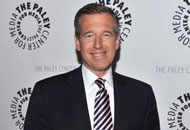
Photo: Daniel Zuchnik/FilmMagic/Getty Images
The NBC news anchor (and 30 Rock guest star) explains why he loves all things nonfiction.
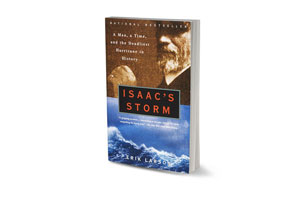 Isaac's Storm
Isaac's Storm
By Erik Larson
In 1900 a hurricane barreled through the Gulf of Mexico and leveled an unsuspecting Galveston, Texas, killing more than 6,000 people. Larson recounts the mistakes the newly established U.S. Weather Bureau operatives made and gives an almost hour-by-hour description of what survivors went through. "This storm transformed the way we look at hurricanes," Williams says. "I think it may be the perfect short work of nonfiction. Wherever you're reading it, the air suddenly turns humid and dank and charged. I've given it more than any other book as a gift."
Brian's next pick: The Life and Times of the Thunderbolt Kid

Photo: J Muckle/Studio D
The Life and Times of the Thunderbolt Kid
By Bill Bryson
Bryson's memoir of growing up in Des Moines captures the optimism of American life in the 1950s. "My wife gave this to me," says Williams. "She thought that I could use a little lightness in my reading. My memories as a kid are of a kind of clunky, grindingly middle-class America, where an American cheese slice individually wrapped was the biggest deal in the world. Also, a roasted marshmallow. And half a Popsicle—you had to get the crack absolutely right or someone got shortchanged. This book is how I grew up. I laughed through it in bursts, in paroxysms, in spasms."
Brian's next pick: No Ordinary Time
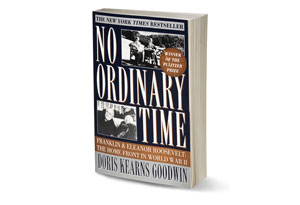
Photo: J Muckle/Studio D
No Ordinary Time
By Doris Kearns Goodwin
"I'm in the tank for Doris," says Williams. "I'm maybe her greatest admirer. She's an approachable, noble historian." Goodwin has written four presidential histories, including this riveting biography of Franklin and Eleanor Roosevelt during World War II. "This book transports you to the upper floors of the White House," Williams says. "It conveys the sound of FDR's cocktail shaker. You can smell the cigarette smoke and hear his hearty laugh from the next room. It reminds you how optimistic and headstrong our country was and can still be." Best of all, you really get to know Roosevelt, who was "5 percent wheelchair and 95 percent optimism and brought us out of the darkest time."
Brian's next pick: The Promise
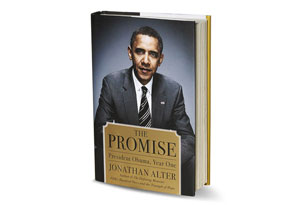
Photo: J Muckle/Studio D
The Promise
By Jonathan Alter
A Newsweek columnist with unique access and connections, Alter focuses on the first 16 months of Obama's presidency, from the November 2008 election to the passage of the healthcare bill in March. "Years from now, relatively quick turnaround works, like this one, will be hugely valuable," says Williams. "This book contains startling oversharing by people. I was surprised as someone who's been around this crowd for the last couple of years that they didn't seem to mind the level of detail in the telling of the story. I got a kick out of the fact that there was a complaint in there about us. When we finally descended on the West Wing for a daylong taping at the White House, Alter notes that Rahm Emanuel, Obama's chief of staff, was proud to have kicked us out of his office eight times that day."
Brian's next pick: The Great Bridge
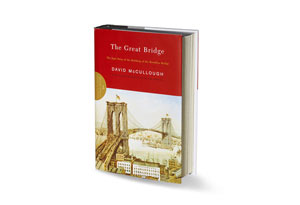
Photos: J Muckle/Studio D
The Great Bridge
By David McCullough
The author is probably best known for his doorstop biography of President Truman, but in this book, he tells "a quintessential American story," says Williams: how the Brooklyn Bridge came to be. There had been talk of a bridge over the East River for about as long as there were people on either side of it, but it was thought to be an absurd, impossible idea until John Roebling figured out how to span the busy, turbulent waterway. "I haven't been able to drive past or fly over the bridge the same way since," says Williams. "We're often in a big hurry and we make cell phone calls in cars as we pass over it, but it seems a sacrilege to me now to do anything but stop and give this bridge its due."
Brian's next pick: Personal History
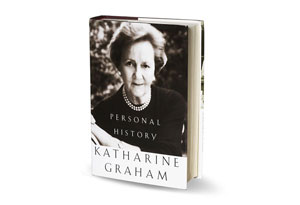
Photo: J Muckle/Studio D
Personal History
By Katharine Graham
In her memoir, Graham not only tells her story—of a sheltered childhood, years of happy marriage before her husband's mental illness led him to suicide, her decision to lead The Washington Post —but also gives an insider's take on key moments in 20th-century American politics, like Watergate and the leaking of the Pentagon Papers. "Katharine Graham was a one-of-a-kind American character," says Williams. "But because she operated in what is so often described as a provincial small Southern city in a company town, she wasn't as well known as she probably should have been. Her story is fascinating, and it makes me angry when I hear her described as a female Lou Grant. That's an insult to the gender, to Mrs. Graham—and to Lou Grant."
Brian's next pick: Taking Charge + Reaching for Glory
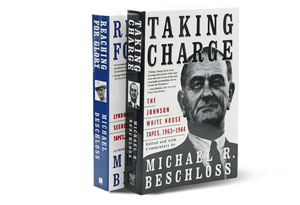
Photo: J Muckle/Studio D
Taking Charge + Reaching for Glory
By Michael R. Beschloss
"For the longest time, I commuted from Connecticut through New York City to an office in New Jersey and back again every night," says Williams. "I listened to every book on tape I could get my hands on." Beschloss wrote these two volumes about Lyndon B. Johnson's presidency, based on the secret tapes Johnson made while in office. Williams likes the audio versions of the books because they include excerpts from the actual Johnson recordings: "It's just spectacular," says Williams, "because you can hear the old man himself."
Next: The book Brian Williams recommends above all others
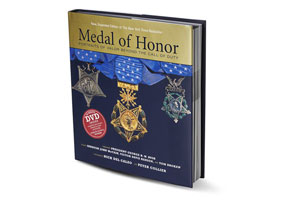
Photo: J Muckle/Studio D
The book he recommends above all others
Medal of Honor: Portraits of Valor Beyond the Call of Duty
"I'm on the board of the Medal of Honor foundation," says Williams. "There are 90 people living who have the medal, the highest award given by our country. We lost one of them this May—his name was John Finn. He was 100 years old, and he stood in an open field in Hawaii and fired at planes for two hours on Sunday morning, December 7, 1941. He was hit 21 times. If you read one story per day, you'll never have a bad day. They speak to what we're all capable of."
More Books That Made a Difference
Photo: J Muckle/Studio D




